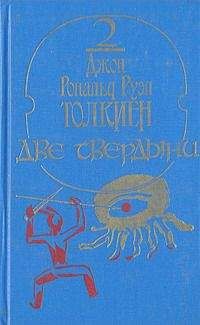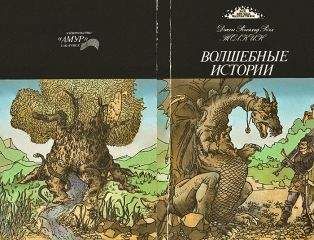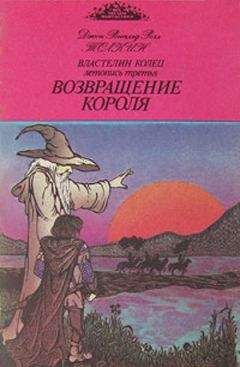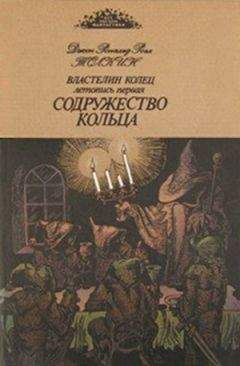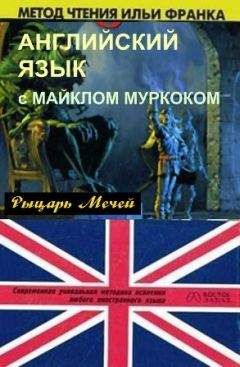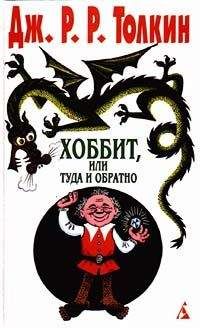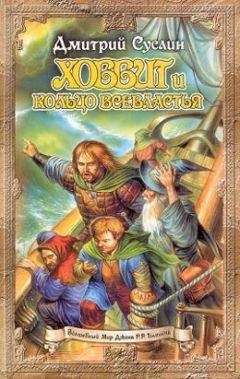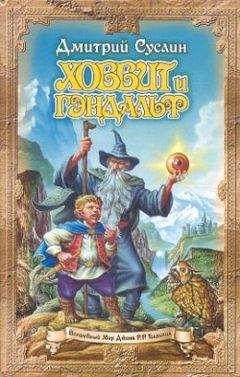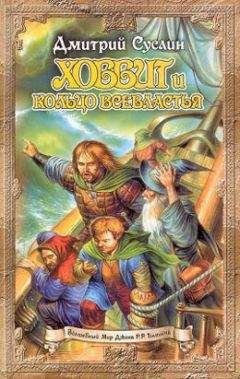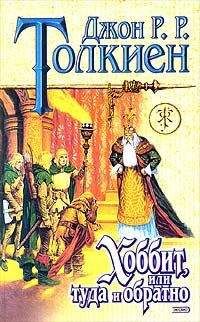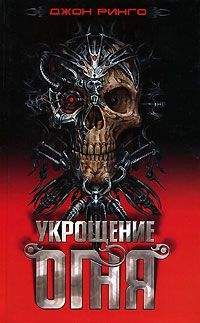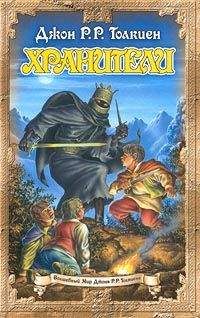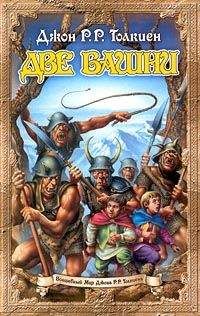Джон Толкиен - Английский язык с Дж. Р. Р. Толкиеном. Хоббит
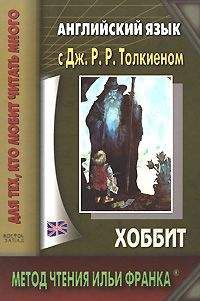
Все авторские права соблюдены. Напишите нам, если Вы не согласны.
Описание книги "Английский язык с Дж. Р. Р. Толкиеном. Хоббит"
Описание и краткое содержание "Английский язык с Дж. Р. Р. Толкиеном. Хоббит" читать бесплатно онлайн.
В книге предлагается произведение на английском языке Джона Р. Р. Толкиена «Хоббит», адаптированное (без упрощения текста оригинала) по методу Ильи Франка. Уникальность метода заключается в том, что запоминание слов и выражений происходит за счет их повторяемости, без заучивания и необходимости использовать словарь.
Пособие способствует эффективному освоению языка, может служить дополнением к учебной программе.
Предназначено для студентов, для изучающих английский язык самостоятельно, а также для всех интересующихся английской культурой.
Пособие подготовила Ольга Ламонова.
“O very well (ну хорошо), ” said Thorin. “Long ago (давным-давно) in my grandfather Thror’s time (во времена моего деда Трора) our family was driven out of the far North (нашу семью выжили с дальнего Севера; to drive smb., out of a place — выгонять, вытеснять кого-либо откуда-либо), and came back (и /они/ вернулись) with all their wealth (со всем их богатством) and their tools (и их инструментами) to this Mountain on the map (к этой Горе, что на карте). It had been discovered by my far ancestor, Thrain the Old (она была обнаружена /за долго до этого/ моим дальним предком, Старым Трейном), but now they mined (но теперь они вели горные работы) and they tunnelled (и прокладывали туннели) and they made huger halls (и они сделали еще большие залы) and greater workshops (и еще более огромные мастерские) — and in addition (и ко всему прочему; addition — прибавление) I believe they found a good deal of gold (я полагаю, что они нашли довольно много золота) and a great many jewels too (и очень много драгоценных камней к тому же). Anyway they grew immensely rich and famous (в любом случае, они стали неимоверно богатыми и знаменитыми), and my grandfather was King under the Mountain again (и мой дед снова стал Королем под Горой) and treated with great reverence by the mortal men (и к нему относились с великим уважением все смертные люди), who lived to the South (которые жили к Югу), and were gradually spreading up the Running River (и которые постепенно расселялись вверх, до Реки Быстротечной; to spread — распространять, расстилать) as far as the valley overshadowed by the Mountain (до самой долины, на которую отбрасывала тень сама Гора).
wealth [welƟ] mountain [ˈmaʋntɪn] ancestor [ˈænsǝstǝ, ˈænsestǝ] jewel [ˈdʒu: ǝl]
“O very well, ” said Thorin. “Long ago in my grandfather Thror’s time our family was driven out of the far North, and came back with all their wealth and their tools to this Mountain on the map. It had been discovered by my far ancestor, Thrain the Old, but now they mined and they tunnelled and they made huger halls and greater workshops and in addition I believe they found a good deal of gold and a great many jewels too. Anyway they grew immensely rich and famous, and my grandfather was King under the Mountain again and treated with great reverence by the mortal men, who lived to the South, and were gradually spreading up the Running River as far as the valley overshadowed by the Mountain.
They built the merry town of Dale there in those days (они построили там веселый город Дейл в те самые дни). Kings used to send for our smiths (Короли бывало посылали за нашими мастерами; smith—кузнец, рабочийпо металлу), and reward even the least skilful most richly (и вознаграждали даже самых наименее искусных очень щедро; richly — богато, роскошно). Fathers would beg us (отцы умоляли нас) to take their sons as apprentices (взять их сыновей подмастерьями), and pay us handsomely (и щедро платили нам), especially in food-supplies (особенно запасами продовольствия; food — еда, пища; supply — снабжение, поставка), which we never bothered to grow (которые мы никогда не утруждались выращивать) or find for ourselves (или собирать для себя). Altogether those were good days for us (в общем, то были для нас добрые деньки), and the poorest of us (и даже самые беднейшие из нас) had money to spend and to lend (имели деньги, чтобы потратить или дать взаймы), and leisure to make beautiful things (и свободное время, чтобы изготавливать прекрасные вещицы) just for the fun of it (просто ради удовольствия; fun — веселье, забава, интерес), not to speak of (не говоря уже о) the most marvellous and magical toys (наиболее изумительных и волшебных игрушках), the like of which (подобия которым) is not to be found in the world now-a-days (нельзя найти в этой мире в наши дни). So my grandfather’s halls (итак, залы моего деда) became full of armour and jewels (заполнились: «становились полными» доспехами и драгоценностями) and carvings and cups (и резными изделиями и чашами), and the toy-market of Dale (и рынок игрушек в Дейле) was the wonder of the North (считался чудом Севера).
smith [smɪƟ] apprentice [ǝˈprentɪs] leisure [ˈleʒǝ] marvellous [ˈmɑ: v (ǝ) lǝs]
They built the merry town of Dale there in those days. Kings used to send for our smiths, and reward even the least skilful most richly. Fathers would beg us to take their sons as apprentices, and pay us handsomely, especially in food-supplies, which we never bothered to grow or find for ourselves. Altogether those were good days for us, and the poorest of us had money to spend and to lend, and leisure to make beautiful things just for the fun of it, not to speak of the most marvellous and magical toys, the like of which is not to be found in the world now-a-days. So my grandfather’s halls became full of armour and jewels and carvings and cups, and the toy-market of Dale was the wonder of the North.
“Undoubtedly that was what brought the dragon (без всякого сомнения, именно это и привлекло дракона; to bring (brought) — приносить, приводить). Dragons steal gold and jewels, you know (драконы крадут золото и драгоценности, как вы знаете), from men and elves and dwarves (у людей, и эльфов, и гномов), wherever they can find them (везде, где они могут их найти); and they guard their plunder (и они охраняют свою награбленную добычу) as long as they live (до самой смерти: «так долго, как они живут») (which is practically forever (то есть, практически, вечно), unless they are killed (если только их не убивают)), and never enjoy a brass ring of it (и никогда не пользуются ни малейшей ее частью; brass ring — досл. латунное колечко). Indeed they hardly know a good bit of work from a bad (на самом деле, они вряд ли отличат хорошее изделие от плохого; bit — кусок, частица), though they usually have a good notion (хотя у них обычно очень хорошее представление) of the current market value (о текущей рыночной стоимости); and they can’t make a thing for themselves (и они сами-то своими руками и сделать ничего не могут), not even mend (даже не могут отремонтировать) a little loose scale (небольшую разболтавшуюся чешуйку; loose — свободный, несвязный) of their armour (в своей броне). There were lots of dragons (много драконов было) in the North in those days (на Севере в те дни), and gold was probably getting scarce up there (и золото, может быть, становилось там редкостью), with the dwarves flying south (из-за того, что гномы улетали/спасались бегством на юг; to fly (flew, flown) — летать, нестись) or getting killed (или были убиты), and all the general waste and destruction (и из-за всего того всеобщего уничтожения и разрушений) that dragons make (которые производят драконы) going from bad to worse (становясь все хуже и хуже: «идя от плохого к худшему).
elves [elvz] guard [ɡɑ: d] plunder [ˈplʌndǝ] value [ˈvælju: ] armour [ˈɑ: mǝ]
“Undoubtedly that was what brought the dragon. Dragons steal gold and jewels, you know, from men and elves and dwarves, wherever they can find them; and they guard their plunder as long as they live (which is practically forever, unless they are killed), and never enjoy a brass ring of it. Indeed they hardly know a good bit of work from a bad, though they usually have a good notion of the current market value; and they can’t make a thing for themselves, not even mend a little loose scale of their armour. There were lots of dragons in the North in those days, and gold was probably getting scarce up there, with the dwarves flying south or getting killed, and all the general waste and destruction that dragons make going from bad to worse.
There was a most specially greedy (был там один, самый-самый, особенно жадный; greed — жадность), strong and wicked worm called Smaug (сильный и злобный змей по имени Смауг). One day (однажды) he flew up into the air (поднялся: «взлетел» он в воздух) and came south (и направился на юг). The first we heard of it (первое, что мы услышали /о нем/) was a noise like a hurricane coming from the North (это был шум, похожий на ураган, идущий с Севера), and the pine-trees on the Mountain (и сосны на Горе) creaking and cracking in the wind (скрипели и трещали на ветру). Some of the dwarves who happened to be outside (некоторые гномы, так уж случилось, были на улице: «снаружи») (I was one luckily (к счастью, я был одним из них) — a fine adventurous lad in those days (прекрасный, любящий приключения парень /был я/ в те дни) always wandering about (всегда бродящий /по окрестностям/) and it saved my life that day (и это-то и спасло мою жизнь в тот день)) — well, from a good way off (так вот, издалека) we saw the dragon (мы увидели, как дракон) settle on our mountain (устроился на нашей горе) in a spout of flame (весь в струях пламени; spout — струя, поток). Then he came down the slopes (затем он двинулся вниз по склонам) and when he reached the woods (и когда он добрался до лесов) they all went up in fire (все они загорелись огнем). By that time (к этому времени) all the bells were ringing in Dale (все колокола звонили в Дэйле) and the warriors were arming (и воины вооружались). The dwarves rushed out (гномы бросились наружу) of their great gate (через свои главные ворота); but there was the dragon (но там-то и был дракон) waiting for them (поджидающий их). None escaped that way (никто не смог сбежать тем путем). The river rushed up in steam (река быстро превратилась в пар; to rush — бросаться, мчаться) and a fog fell on Dale (и туман окутал Дейл; to fall (fell, fallen) — падать, опускаться), and in the fog the dragon came on them (и в этом тумане дракон обрушивался на них) and destroyed most of the warriors (и уничтожил большинство воинов) — the usual unhappy story (обычная печальная: «несчастливая» история), it was only too common in those days (это было более чем обычно в те дни: «она была только слишком обычной в те дни»).
greedy [ˈɡri: dɪ] wicked [ˈwɪkɪd] hurricane [ˈhʌrɪkǝn] adventurous [ǝdˈventʃ (ǝ) rǝs]
There was a most specially greedy, strong and wicked worm called Smaug.
One day he flew up into the air and came south. The first we heard of it was a noise like a hurricane coming from the North, and the pine-trees on the Mountain creaking and cracking in the wind. Some of the dwarves who happened to be outside (I was one luckily — a fine adventurous lad in those days, always wandering about, and it saved my life that day) well, from a good way off we saw the dragon settle on our mountain in a spout of flame. Then he came down the slopes and when he reached the woods they all went up in fire. By that time all the bells were ringing in Dale and the warriors were arming. The dwarves rushed out of their great gate; but there was the dragon waiting for them. None escaped that way. The river rushed up in steam and a fog fell on Dale, and in the fog the dragon came on them and destroyed most of the warriors — the usual unhappy story, it was only too common in those days.
Then he went back (затем он направился назад) and crept in through the Front Gate (и заполз /на Гору/ через Главные Ворота) and routed out all the halls (и уничтожил всех, кто был в залах; to rout — разбивать наголову, обращать в бегство), and lanes (и переулках), and tunnels (и туннелях), alleys (аллеях), cellars (подвалах), mansions (особняках) and passages (и проходах). After that (после этого) there were no dwarves left alive inside (больше не осталось живых гномов внутри /Горы/), and he took all their wealth for himself (и он забрал себе все их богатство). Probably (возможно), for that is the dragons’ way (из-за того, что именно так принято у драконов; way — зд. уклад, обычай, привычка), he has piled it all up (он сложил это все вместе) in a great heap (в огромную кучу) far inside (/где-то/ глубоко внутри /Горы/), and sleeps on it for a bed (и спит на ней, как на кровати). Later he used to crawl out (позднее он бывало выползал) of the great gate (из главных ворот) and come by night to Dale (и добирался до ночам до Дейла), and carry away people (и уносил людей), especially maidens (особенно девиц), to eat (чтобы съесть их), until Dale was ruined (до тех пор, пока Дейл не превратился в руины), and all the people dead or gone (и все люди не вымерли или ушли). What goes on there now (что происходит там сейчас) I don’t know for certain (я не знаю наверняка), but I don’t suppose (но я не думаю) anyone lives nearer to the Mountain (что кто-нибудь живет ближе к Горе) than the far edge (чем у дальнего края) of the Long Lake now-a-days (Длинного Озера в наши дни).
Подписывайтесь на наши страницы в социальных сетях.
Будьте в курсе последних книжных новинок, комментируйте, обсуждайте. Мы ждём Вас!
Похожие книги на "Английский язык с Дж. Р. Р. Толкиеном. Хоббит"
Книги похожие на "Английский язык с Дж. Р. Р. Толкиеном. Хоббит" читать онлайн или скачать бесплатно полные версии.
Мы рекомендуем Вам зарегистрироваться либо войти на сайт под своим именем.
Отзывы о "Джон Толкиен - Английский язык с Дж. Р. Р. Толкиеном. Хоббит"
Отзывы читателей о книге "Английский язык с Дж. Р. Р. Толкиеном. Хоббит", комментарии и мнения людей о произведении.






